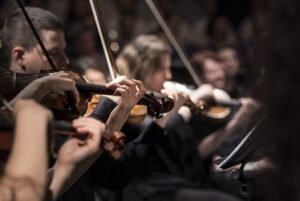 One of the joys of my participation in The Magic Flute over the past weeks, culminating with the performances on April 21 & 22, was the great privilege of just being around a whole group of talented people and getting to overhear things they said and did. I told one of the other MF chorus performers that I’d be willing to crawl over broken glass to be able to sing Mozart and work with Devin Patrick Hughes, the conductor of the Arapahoe Symphony. We didn’t have as much interaction with him this time as we’ve had when the Chorale has been a bigger part of the program,* but I was struck by one little comment he made to the orchestra during dress rehearsal: “Keep your ears on stage at all times.” He was reminding his players that they were in this instance the accompaniment; the singers were the main focus. His statement was a nice musical twist on the more common saying “Keep your eye on the ball.”
One of the joys of my participation in The Magic Flute over the past weeks, culminating with the performances on April 21 & 22, was the great privilege of just being around a whole group of talented people and getting to overhear things they said and did. I told one of the other MF chorus performers that I’d be willing to crawl over broken glass to be able to sing Mozart and work with Devin Patrick Hughes, the conductor of the Arapahoe Symphony. We didn’t have as much interaction with him this time as we’ve had when the Chorale has been a bigger part of the program,* but I was struck by one little comment he made to the orchestra during dress rehearsal: “Keep your ears on stage at all times.” He was reminding his players that they were in this instance the accompaniment; the singers were the main focus. His statement was a nice musical twist on the more common saying “Keep your eye on the ball.”
But then I thought, ‘Isn’t there some quotation about keeping the main thing the main thing?’ And sure enough, here it is:
“The main thing is to keep the main thing the main thing.”
And who said that, might you ask? None other than my old nemesis Stephen Covey. (“Nemesis” in the sense that I could never get very far into his famous book The Seven Habits of Highly Effective People. Honestly! If ever a book cried out for being made into a Reader’s Digest Condensed Book it’s this one. And two of my favorite idea people, my pastor and Mr. Money Mustache, both love that book. MMM says, “I have an audiobook version of the book in MP3 format, and at least once a year it comes up on random play on the digital memory card labeled ‘Cross Country Roadtrips’ that I pop into the car stereo at the start of long voyages.” For me, trying to listen to that book while driving would be a sure path to falling asleep at the wheel. But you can get a good overview of Covey’s Seven Habits on his website, so all is not lost if you want to absorb his ideas without having to wade through so much excess verbiage.)
Just in case you want an even shorter version of the Seven Habits, here they are, with a link provided for each one to the relevant website page:
1. Be proactive.
2. Begin with the end in mind.
4. Think Win-Win.
5. Seek first to understand, then to be understood.
6. Synergize.
7. Sharpen the saw.
All of these are great ideas. I especially need to follow #5, to listen to what the other person has to say and to quit interrupting. It’s amazing how much you can learn if you keep your mouth shut.
Are you focusing on the main thing?
*Have to put in a small plug here for my book on the meaning of the lyrics in Carmina Burana, which the Chorale performed with the Arapahoe Phil in the fall of 2013. It was that performance that got me started on writing my background essays on the pieces that the Chorale performs and which has now led to this opus and, I hope, to others. Check it out if you’re so inclined!